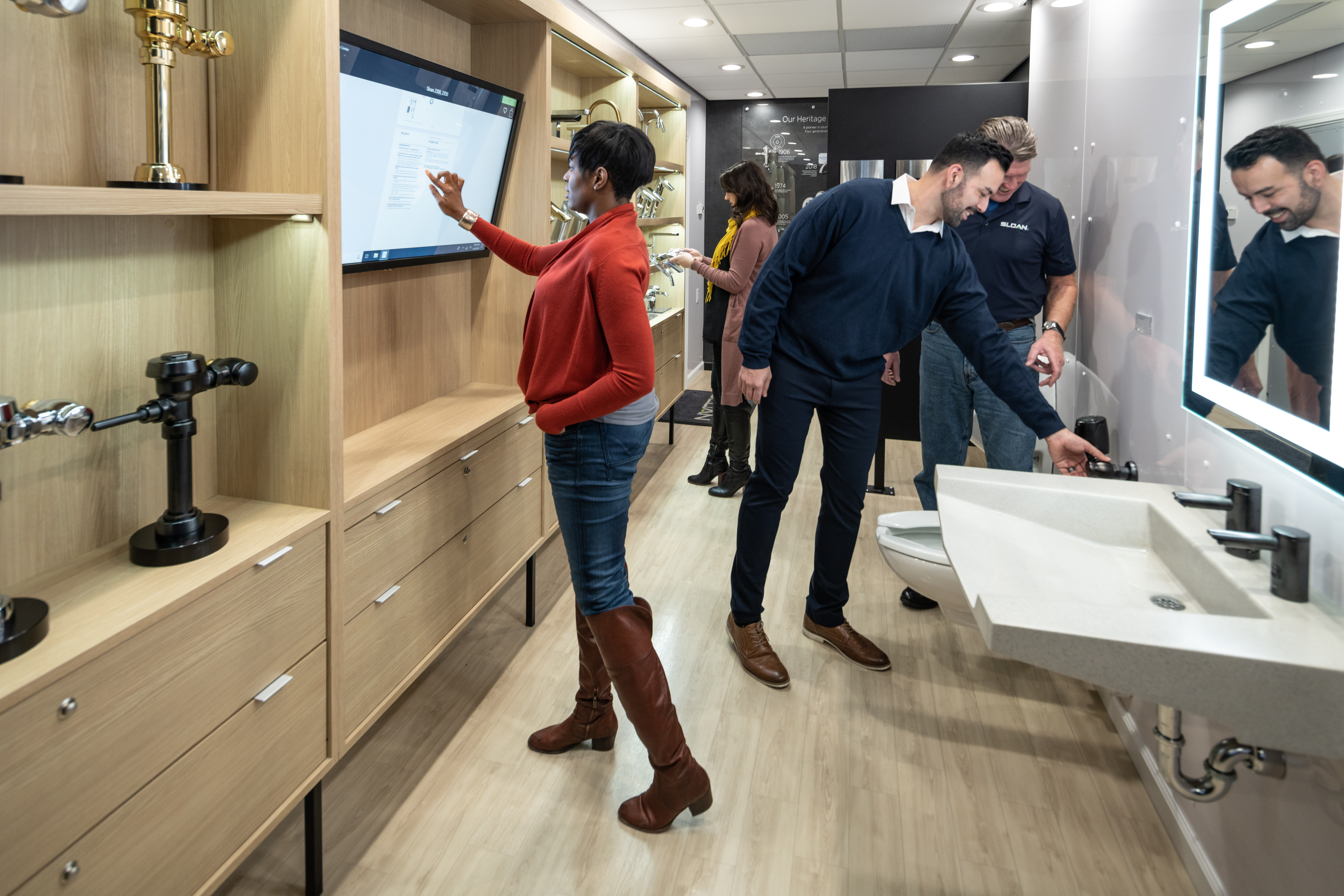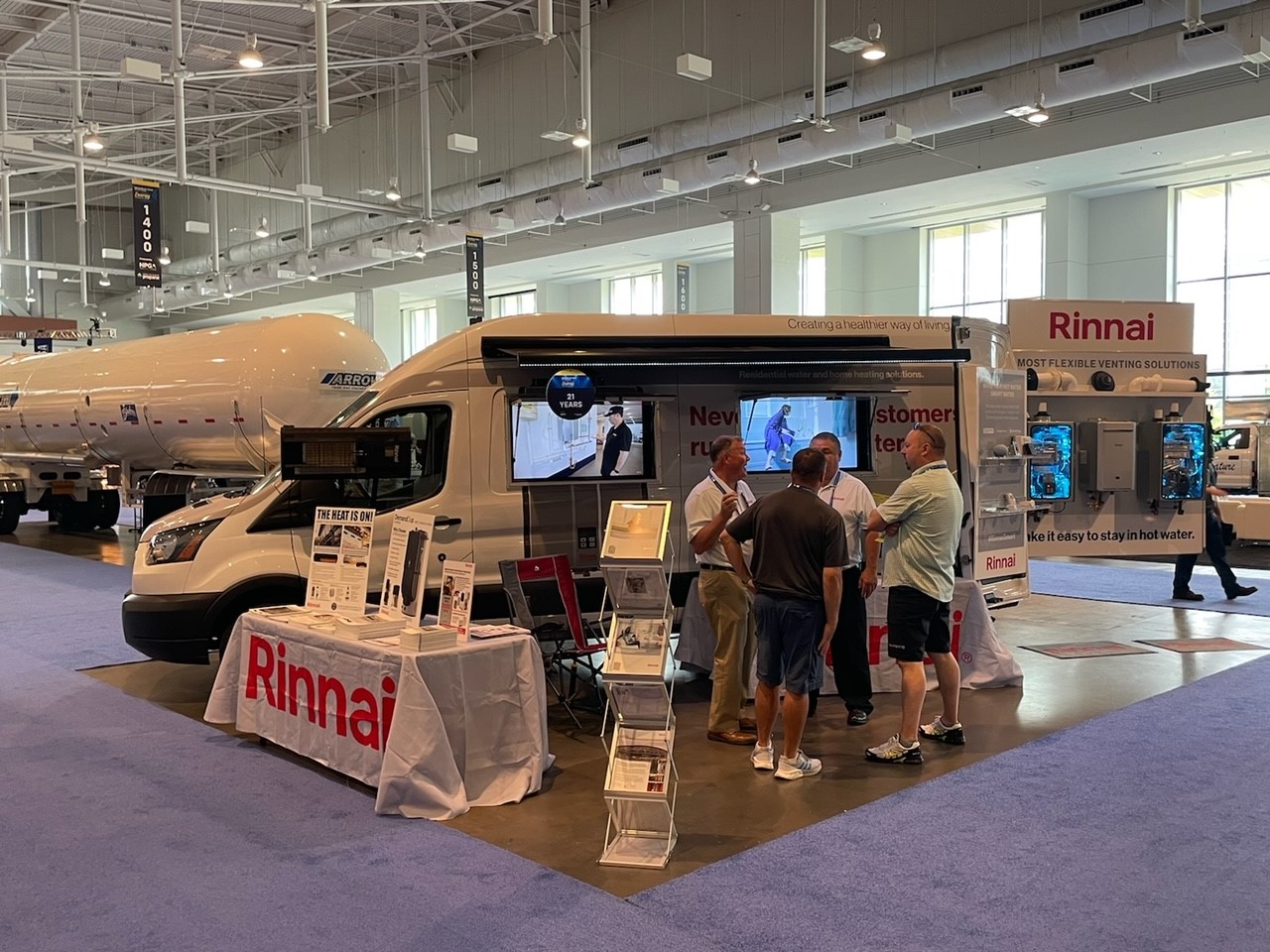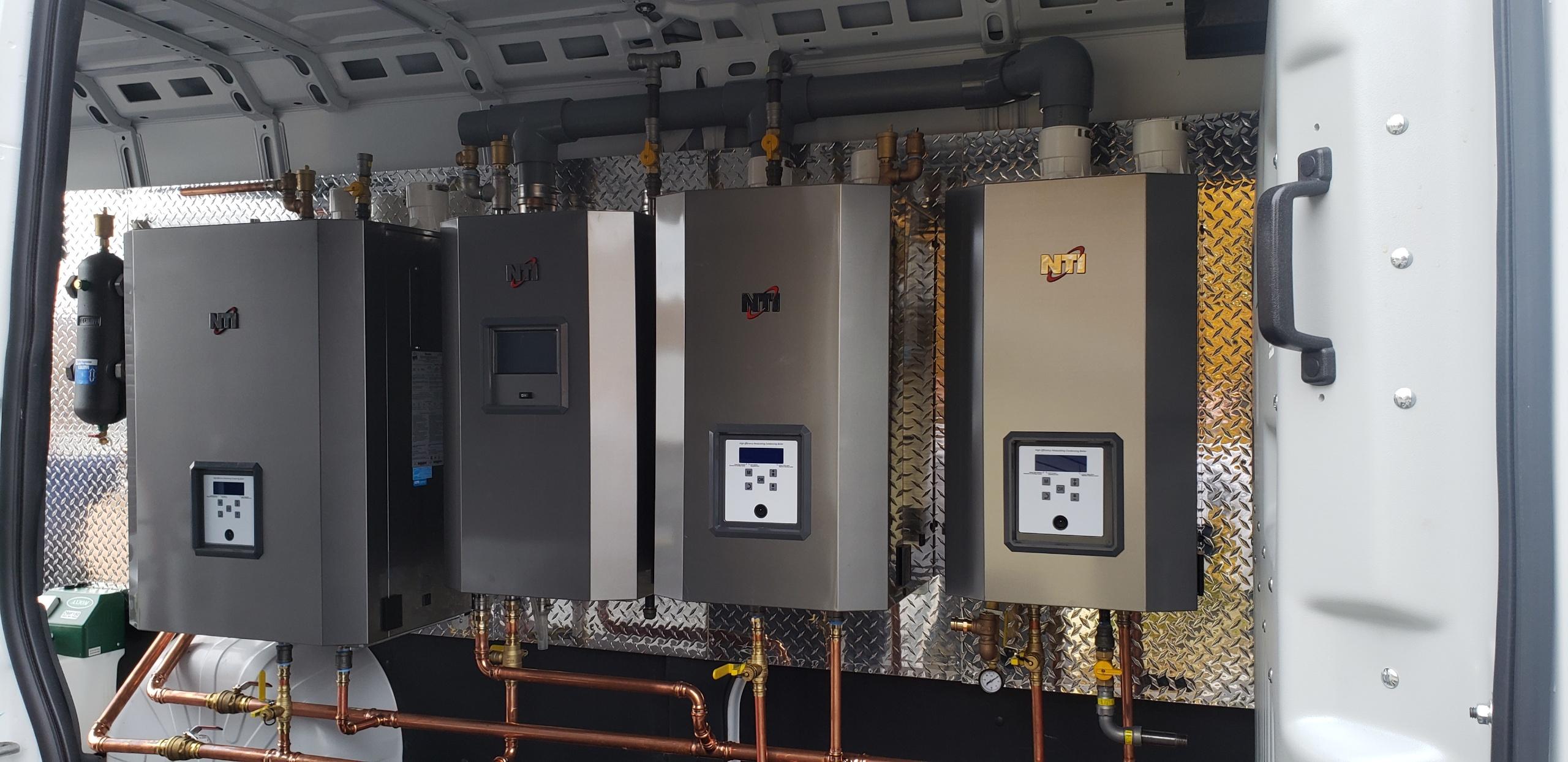When COVID-19 first rolled in, mobile training vehicles favored by plumbing and heating companies stopped moving. Though these vehicles hold a treasure trove of displays and demos that help plumbing contractors install products and wholesalers sell more, the trucks presented health risks as the novel virus snaked its way through the population.
Now, the U.S. is back to business, so are these trucks. But the trucks operate under a new normal, says Bud Katzmann, marketing director for Triangle Tube.
“I’m not sure it will ever go back to the way it was before,” he says. “At least in the near term, consumer demand spikes have put a premium on contractor’s availability along with regional/state differences around safely dealing with COVID spikes. But we are excited to be back out face to face seeing customers again.”
Mike Hook, U.S. Boiler marketing and communication manager, cites another reason why things are not fully back to speed. Contractors, he says, had limited time for demos as consumer demand ramped up when pandemic shutdowns ended.
“Things are not all the way back mostly because of contactor scheduling,” he says. “Contractors are freeing up a bit more as of late and we’ve seen a marked increase in requests for display vehicles.”

Christopher Peterson, national sales manager at SFA Saniflo, tells a slightly different tale. He reports the plumbing industry “has not been as restricted as other industries with live training, especially when the method for demonstrations is outdoors. Today, we are mostly back to normal without restrictions.”
Comfort levels regarding in-person meetings also have increased, adds Jeff Vallet II, segment market manager of hydronics for Lochinvar.
“We’ve seen a definite hunger among customers to return to in-person training and events,” he stresses. “To accommodate this, we’ve brought back in-person training classes and we’ve put our mobile training truck on the road again.”
Dave Walsh, vice president of sales for NTI-USA, reports lingering COVID concerns have led the company to offer hybrid training that blends classroom education, remote training and demo vans for small hands-on training sessions.
The new normal also requires companies to keep a constant eye on COVID levels in the regions they visit, adds Jim De Broeck, manager of industry marketing for Viega. He explains things are mostly “back to normal,” but adds Viega continues to “monitor the COVID situation to keep employee and customer safety our No. 1 priority.”
Still, Viega plans to run a full calendar year of stops.
“We have already visited dozens of locations this year,” De Broeck adds.
Sloan shares a similar story with its mobile showroom, which has inched closer to pre-COVID levels. However, Jeff Gilmore, vice president of strategic accounts for Sloan, says it’s now harder to get architects and designers to visit mobile showrooms.
Wes Sisco, national training manager for IBC, a Rheem family brand, reports they take health safety seriously as the company operates its mobile training vehicles.
For example, during COVID, IBC hosted training sessions at individual contractor locations to keep people safe while addressing the training needs of partner contractors and installers. As a result, Sisco says they see a surge in demand for in-person training sessions.
“While major COVID restrictions have lightened, we still aim to accept an appropriate number of participants for each location and tailor sessions to the interests of each group,” Sisco says.

He adds: “We used the trucks through the pandemic while adhering to safety guidelines, allowing us to continue training and building contractor relationships while avoiding any risks posed by airports and big crowds. Since the easing of pandemic restrictions, we have seen an even stronger than expected increase in IBC mobile training session requests as many participants are still unwilling to travel.”
High value mobile assets
Mobile training might appear different post-pandemic, but the vehicles’ benefits remain the same.
“These vehicles provide a fantastic way to provide live fire hands on training and experiences for contractors who lack the time to travel to a training facility,” reports Katzmann, who notes Triangle Tube uses mobile trailers to provide personalized training.
Hook agrees that mobile training vehicles offer unparalleled training flexibility. He explains U.S. Boiler’s fleet of Ford Transit Connect cargo vans, which showcases the company’s high efficiency condensing boilers, can “roll into an indoor trade show, act as an outdoor display at a distributor counter day event or drive directly to a specific contractor for a one-on-one demo. They are small enough to roll into a garage if weather becomes a factor.”
Randall Waldron, vice president of sales and marketing for Liberty Pumps, shares this sentiment. Liberty Pumps uses a trailer equipped with working products for live demonstrations and brand awareness. “Letting customers get hands-on with our products is much more valuable than sales literature or viewing products online,” he says. “They can watch live demonstrations, talk to knowledgeable factory personnel, and ask questions regarding installation and application.”
In 1987, Lochinvar became the first in the industry to utilize a mobile training vehicle. The company still sees tremendous success in its 30-foot, climate-controlled box van used for mobile training.
“There is incredible value in bringing products directly to customers,” says Vallet II. “Our customer’s time is important. Not everyone can travel for training. But we know that hands-on training is critical. The mobile training truck offers an excellent way to bring products directly to customers for hands-on interaction.”
Having a fleet of five Sprinter vans and a single box-style extended Sprinter with all-wheel drive and dualies in the rear helps NTI increase its footprint, notes Walsh. So much so that NTI plans to add two Sprinter vans in 2022.
“We no longer have to schedule room at a hotel or at a distributor’s location,” he says. “The vans take training to the contractor. We can have live-fire equipment demonstrations at their shop, distributor location, counter day or trade show. Flexibility and mobility are tremendous assets in getting technical training in front of the contractor.”

Face time
Getting back in front of the contractor is a big reason Rinnai America Corp. decided earlier this year to revive its Try Rinnai Tour.
“We recognize that our customers are very busy and have limited time to learn about new products and technologies,” says David Federico, senior director of marketing for Rinnai America Corp. “The Try Rinnai Tour vans allow us to bring our products to our customers, whether that is at their business locations or at distributor locations.”
The company’s fleet of seven Ford Transit vans began traveling to various locations across the U.S. and Canada last May and will wrap up its travels next month.
In all, the Rinnai vans are expected to travel to 500 events and interact with up to 20,000 PHC professional installers
Federico says the Rinnai sales team will focus their education and training opportunities on two new product launches: The RSC Condensing Tankless Water Heater and the RE Series, the first noncondensing water heater to include a built-in recirculation pump. The tour will also detail the new Smart-Circ Intelligent Recirculation technology, available in both products.
The vans are designed to showcase the Rinnai products with a special pullout wall.
“In addition, the vans feature two monitors installed on the side that allow us to give presentations and show videos during events,” Federico adds.
Meanwhile, Peterson says the biggest benefit of Saniflo’s demo vans is the personal interaction with core customers.
“These demo vans give us the ideal environment to show plumbing professionals how our products work and what the ideal installation looks like,” Peterson says.
Walsh adds that ROI also comes in increased brand awareness as NTI vans move across the U.S. and Canada.
“We wrap all our vehicles in the same way to display the breadth of the NTI product line,” Walsh says. “The vehicles are moving billboards for us as well as effective training tools.”
Peterson says the same of Saniflo vehicles, a fleet of four mobile demonstration vans, which include two Ford E350 box trucks, an Isuzu box truck, and a Ford E350 with an aerodynamic fiberglass hull. The vehicle wraps promote their products. Often, as Peterson gases up the vehicle, people stop and ask for literature because they seek the solutions highlighted on the exterior wrap.
The training vans are particularly effective, because Saniflo products aren’t what customers typically find in a supply house showroom or counter display. The van makes believers in Saniflo products, because trainees can see firsthand how Saniflo’s “above-floor” plumbing systems work.
The vehicles also boost Saniflo’s marketing and advertising efforts.
“We use these training events to better understand how we can share our unique solutions and improve our own communications,” Peterson explains.
The Viega Roadshow truck comprises a branded, Ford F650 chassis with an 18-foot box. This vehicle has slideouts similar to those in an RV to provide ample space for product displays and demonstration areas. This heated and air-conditioned vehicle also offers a staged area for demonstrating to larger crowds and a wide entrance.
“There are many good reasons for our Viega Roadshow, beginning with the connections we make with customers,” De Broeck says. “Viega values its service approach, and the Viega Roadshow is one way we can further cultivate relationships. Our truck lets customers experience the ah-ha moment of press technology and the value it can provide for their job or business.”
Sloan’s mobile showroom, a custom-built, 38-foot trailer, highlights the company’s range of commercial restroom innovations. The showroom includes functional displays of Sloan’s full product line and a touchscreen monitor to access Sloan Center digital assets, material samples and more.
Gilmore adds the vehicle provides a more distinct experience than shopping for Sloan products online. The company brings the showroom to contractors’ hometowns.
“Architects and designers are aesthetically driven, so seeing restroom products in person is far more compelling than a presentation or literature,” Gilmore says.
Using a trailer for this purpose also provides flexibility for North American tours. Gilmore explains Sloan’s vehicle can navigate busy streets and fit into tight parking spots, but is still large enough to provide detailed product demos.
While a classroom delivers the ultimate in hands-on training, Sisco of IBC, reports a mobile classroom offers unmatched flexibility and customer service.
“A mobile classroom is very efficient and having live boilers to demonstrate and teach allows for interactive, hands-on training anywhere in the country,” Sisco says.

IBC mobile vehicles comprise a light-duty pickup truck, which holds three live boilers, an IBC air handler, a VX boiler, and a rising TV for informative PowerPoint presentations. Sisco reports that IBC will train any number of participants. Still, smaller groups allow for a more intimate learning experience allowing everyone to participate and ask questions.
“We find most groups are interested in learning about proper installation techniques and tips for troubleshooting,” Sisco says. “These sessions also provide a rare opportunity for IBC to build personalized relationships with our contracting partners while offering participants effective and convenient development options.”
Select and outfit demo vehicles
Size matters when choosing vehicles for this purpose, according to Hook. He notes the relatively small size of U.S. Boiler’s display vans lets them get in and out of locations far more easily than large vehicles or trailers.
“We didn’t realize how effective these smaller vehicles would be to display our products during the pandemic, when being in an enclosed space was problematic,” Hook says. “We display our products on the outside of the vehicle, not inside. The boilers extend outward on custom-made brackets and slides.”
And with rising gasoline prices, the smaller vehicles also are more fuel efficient, he adds.
Lochinvar’s vehicles include 60-inch television displays and Wi-Fi access to videos and data, which also is a plus for training, says Vallet II. The vehicles can feature up to six different units at once. Currently, the setup includes the KNIGHT Floor Mount, KNIGHT Wall Mount, NOBLE Combi Boiler, NOBLE Fire Tube Boiler, SQUIRE Indirect Water Heater, and SQUIRE Buffer Tank.
Vallet II adds: “Every unit in Lochinvar’s mobile training truck is piped and wired so screens function like simulators. We also show the piping of the unit as it would be in a real-world application, complete with pumps and an expansion tank.”
Saniflo includes a series of active pumps inside each van/truck. The vehicles highlight the Sanbest Pro (grinder), the Saniacess 3 (macerator), and the Saniswift drain pump under a mop sink. Each van also has a mounted TV to showcase company videos and a sampling of inactive pumps to highlight the complete Saniflo line.
“Nothing works better than demonstrating the flushing capabilities of our pumps to illustrate how they might sound or look in person,” Peterson says.
The Viega Roadshow slideouts expand the room available and allow customers to enter, exit and experience demonstrations easily. The added space allows the company to show the Viega product line in a clean, clear and concise way. The unit also includes a demonstration workbench that lets customers experience the hands-on quality of Viega fittings.
“When people actually use press technology, they understand why it is a game changer that saves time, money and resources,” De Broeck adds.
Having functioning products is necessary on these trucks, adds Gilmore. The Sloan Mobile Showroom showcases the company’s wide range of finishes. Guests can see how finishes like polished brass, brushed stainless, brushed nickel and graphite make an aesthetic difference, while seeing how faucets, soap dispensers and hand dryers actually function.
Scheduling
Every company takes a different approach to scheduling. But all bring demonstrations to contractors instead of the other way around.
“We schedule trainings when and where it is convenient to the contractor,” says Katzmann of Triangle Tube. “We try to remain flexible to address the ever-changing demands they have.”
Triangle Tube puts training trailers in different regions of the country to make them available in individual markets. The local training manager, area sales manager and rep agency work together to facilitate scheduling.
U.S. Boiler sales reps secure reservations for its vans in advance to accommodate specific events. The van stays in an area for a month or two after each event. During that time, reps take the vehicles on individual visits and to other events.
Lochinvar outlines a general path for mobile training trucks rather than a specific schedule. The company selects a region to visit, picks states to stop in, and adds in a variety of stops to reach as many customers as possible.
“This allows flexibility and ensures we can spend quality time with customers at each stop,” Vallet II adds. “Our truck will head to Northern California, work its way up to Seattle, and eventually head to Alaska again in 2022.”
NTI’s team is planning the summer and fall schedule and will publish training dates on its website, promote them through social media, and in trade magazines. The company also works with local distributors to coordinate van visits at specific locations or with specific contractors.

“We communicate stops to distributors participating in mobile training events,” Walsh says. “Our distributors do an excellent job of promoting those and scheduling those contracts. We have little downtime when vans are on the road.”
Liberty Pumps’ regional sales managers coordinate the schedule with drivers weeks before trucks arrive in a territory.
“We have a set schedule of training events planned well in advance,” Waldron says.
Saniflo takes its vans nationwide, avoiding northern states in the winter and southern states in the summer. The company has published a general route for each van for all of 2022 on its website.
Viega schedules the Viega Roadshow around key events, major company initiatives, regional priorities and specific customer relationships. Once Viega schedules and maps major plot points, the route comes into view and the company schedules more stops along the way, De Broeck notes.
Sloan’s tour runs through early December 2022 before a rest until next March. By the end of the year, the company will deliver an all-encompassing tour that gives Sloan’s 40-plus rep agencies in the U.S. and Canada access to the showroom.
IBC training vehicles are always on the road, and training sessions can be conducted for public or private events and easily tailored to a specific audience if needed. To schedule a visit from IBC’s mobile training vehicle, email [email protected].
Companies may have hit pause on their mobile training trucks during the pandemic, but they never lost sight of their value. As the pandemic wanes, these trucks are hitting the road again, giving contractors and designers hands-on access to new plumbing and heating products.





